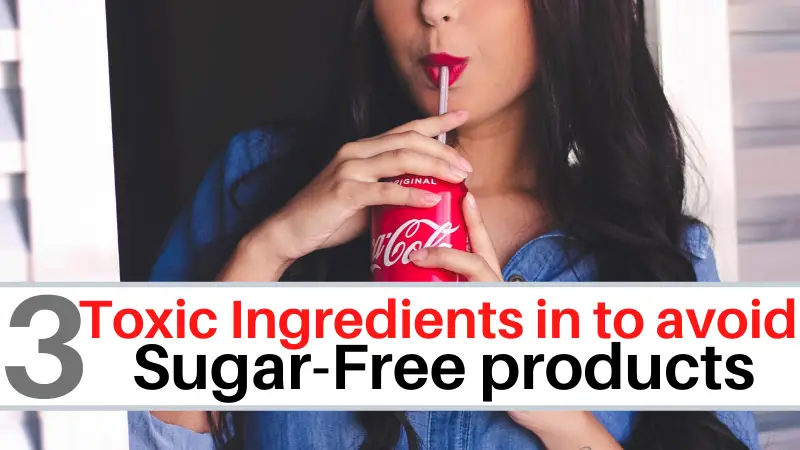Links you click on in this post may earn us a small commission at no cost to you. Thank you for your support.

Sugar is not good for you. But artificial sweeteners are 100 times worse.
When you think of artificial sweeteners, you likely think of Splenda or Stevia.
There are hundreds of things that can be used as a sugar substitute, but they are not all created equal.
Weight gain in the U.S. is a hot topic, and likely always will be.
There is a reason for that!
We try to cut out sugar, so they make something “sugar-like” that has no calories, and you don’t need as much of it.
But instead of permanent weight-loss, you get a laundry list of side effects and illnesses instead.

(This page probably contains affiliate links and information about health and wellness products. If you want to read more about that, check out our disclaimer page)
Why you should never opt for “sugar-free”.
Let’s be honest guys. What does “sugar-free” really imply?
Most items that claim to be sugar-free add in chemical sweeteners that are “calorie-free” to mimic the taste of sugar.
These sweeteners such as Splenda and Aspartame are two of the major players when it comes to artificial sweeteners.
Aspartame
Aspartame is in most soft drinks, diet drinks and foods, sugarless candy, even some condiments and medicines.

This one has some pretty bad side effects.
These include, but ARE NOT limited to:
Depression
Headaches
Seizures
Weight gain
Alzheimer’s
Dizziness
ADHD
Cancer
Splenda
This one used to be a lot more popular, but people do still use it. It is often used as a sugar substitute in coffee, or baking.

Splenda possible side effects include:
- Decreased red-blood count (anemia)
- Infertility
- Toxic to gut bacteria
- Raises risk of type 2 Diabetes
- Heart palpitations
There are a lot more. Click on the link above to see a full article.
Related Content: 4 Things you should NEVER eat.
Acesulfame Potassium
Acesulfame Potassium is one you may not recognize, but is found in a lot of sweeteners, baked goods, jellies, gum and desserts.

It has some nasty side effects, such as:
- Depression
- Headaches
- Nausea
- Visual problems
- Possibility of Cancer
There has been evidence that this particular artificial sweetener can cause Cancer.
Using artificial sweeteners is most definitely NOT the way to go.
It would be much safer to use twice as much Organic cane sugar every day than to use artificial sweeteners such as the ones listed above.
Plant Based Natural Sweeteners
There is still an alternative if you really don’t want to use sugar.
There are plenty of good, plant-based sweeteners that you can use that are little to no calories, and wont negatively impact your long term health.
Stevia
Stevia the sweetener comes from the Stevia plant, which grows mostly is Asia and South America.
The leaves are harvested, dried, and then steeped in hot water.
There is a lot of filtering that goes on before the extract is ready to be sold.

Some of the amazing benefits of switching to Stevia include:
- Lowers blood pressure
- Helps control blood sugar
- Weight loss
- Prevents Cancer
- Helps Eczema and Dermatitis
Xylitol
Xylitol is derived mostly from plants and vegetables, being found in small portions in most of the vegetation we eat.
The kind of Xylitol we buy from the store mostly comes from corn cob and trees.

Check out ther benefits of Xylitol here:
- Fights Cavities
- Strengthens Bones
- Does not spike blood sugar or insulin
- Can reduce yeast and ear infections
- Possible increased Collagen production
Monk Fruit
Monk Fruit sweetener is made from the seeds and skin of the monk fruit plant.
This natural sweetener is 100-250 times sweeter than table sugar, and can be used in very small amounts.

- Does not contain fructose or glucose
- Antioxidant and Anti-inflammatory
- Anti-Cancer
- Helps with Diabetes
So you can see, there are so many better options.
Always read the label, no matter what product you are buying, and make sure the ingredients are 100% what you think they are before buying.
Have a healthy day filled with great choices!

